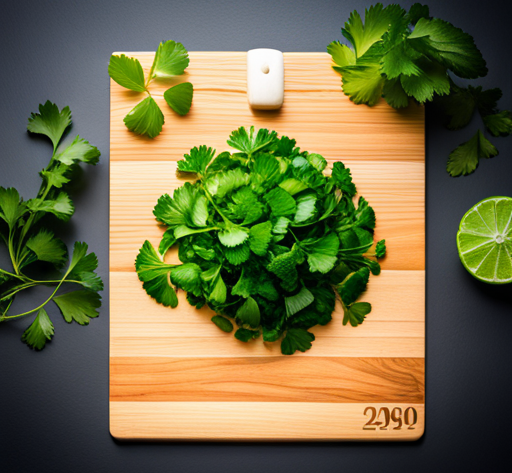Curious about how much cilantro you can safely enjoy every day? Look no further! In this article, we’ll delve into the recommended intake of cilantro, potential risks of excessive consumption, and guidelines for incorporating this flavorful herb into your diet.
Discover the health benefits cilantro brings and get tips for adding it to your daily meals. Get ready to spice up your dishes while staying informed about safe cilantro consumption.
Key Takeaways
- Aim for a moderate amount of cilantro daily, with a recommended serving size of about one-quarter cup or 4 grams.
- Consuming cilantro in moderation has linked to improved digestion, reduced inflammation, and antioxidant properties.
- Cilantro is packed with essential nutrients and antioxidants, providing a good balance of nutrients without overwhelming your system.
- Excessive intake of cilantro can pose risks, including cilantro toxicity when contaminated with heavy metals or pesticides, and symptoms of overdose such as nausea, vomiting, and diarrhea.
Daily Recommended Intake of Cilantro
You should aim to consume a moderate amount of cilantro daily for its potential health benefits.
The daily recommended serving size of cilantro is about one-quarter cup, or roughly 4 grams. This amount provides a good balance of nutrients without overwhelming your system.
Consuming cilantro in moderation has been linked to various health benefits, including improved digestion, reduced inflammation, and antioxidant properties.
However, it’s important to be mindful of the quantity you consume, as cilantro overdose symptoms can occur in some individuals. These symptoms may include diarrhea, stomach cramps, and allergic reactions.
If you experience any adverse effects after consuming cilantro, it’s recommended to reduce your intake or consult with a healthcare professional.
Potential Risks of Consuming Excessive Cilantro
What are the potential risks of consuming excessive cilantro, and how can they affect your health?
While cilantro is generally safe to consume in moderate amounts, excessive intake can pose certain risks. One of the main concerns is cilantro toxicity, which can occur when the herb is contaminated with heavy metals or pesticides. These toxins can accumulate in the body and lead to adverse health effects.
Symptoms of cilantro overdose may include gastrointestinal issues such as nausea, vomiting, and diarrhea. In some cases, individuals may also experience allergic reactions, such as itching or swelling.
It’s important to note that these risks are relatively rare and most people can enjoy cilantro without any problems. However, if you experience any concerning symptoms after consuming excessive cilantro, it’s advisable to consult a healthcare professional.
Safe Consumption Guidelines for Cilantro
Typically, it’s recommended to consume cilantro in moderation on a daily basis. While cilantro is generally safe to eat, it’s important to be aware of safe consumption levels to ensure overall health and well-being.
Cilantro is rich in essential vitamins and minerals, such as vitamin K, vitamin C, and potassium. However, excessive consumption of cilantro may lead to potential health risks, such as allergies or digestive issues for some individuals.
As part of a balanced diet, a safe guideline for cilantro consumption is to include it as a flavorful addition to your meals, rather than consuming large amounts in one sitting. It’s also important to listen to your body and adjust your intake accordingly.
Health Benefits of Incorporating Cilantro Into Your Diet
Including cilantro in your diet can provide numerous health benefits, as it is packed with essential nutrients and antioxidants. Cilantro, also known as coriander, is a versatile herb that adds a unique flavor to dishes. Not only does it enhance the taste of your meals, but it also offers several advantages for your overall health and well-being.
One of the notable benefits of cilantro is its positive impact on the skin. It contains antioxidants that help protect the skin from damage caused by free radicals, which can contribute to premature aging. Additionally, cilantro has anti-inflammatory properties that may help reduce skin irritation and redness.
To further incorporate cilantro into your diet, you can try cilantro-infused recipes. This herb can be used in various dishes such as salads, salsas, marinades, and soups. Its bright and refreshing taste adds a burst of flavor to any meal. So, go ahead and experiment with cilantro to reap its health benefits while enjoying delicious, flavorful dishes.
| Health Benefits of Cilantro |
|---|
| 1. Rich in vitamins A, C, and K |
| 2. Contains antioxidants |
| 3. May aid in digestion |
| 4. Has anti-inflammatory properties |
Tips for Incorporating Cilantro Into Your Daily Meals
How can you easily incorporate cilantro into your daily meals? Here are some tips to help you make the most of this flavorful herb:
-
Add it to your salads: Chop up some fresh cilantro leaves and sprinkle them over your favorite salad. The bright and citrusy flavor of cilantro will enhance the taste of your greens.
-
Use it as a garnish: Cilantro makes a great garnish for soups, stews, and curries. Just sprinkle a few leaves on top of your dish to add a burst of freshness.
-
Blend it into sauces and dressings: You can blend cilantro with other ingredients like yogurt, lime juice, and garlic to create a delicious sauce or dressing. This is a great way to infuse your meals with the flavor of cilantro.
-
Try it in stir-fries and sautés: Add chopped cilantro towards the end of cooking to retain its fresh flavor. It pairs well with vegetables, meats, and seafood.
Frequently Asked Questions
Can Cilantro Help With Digestion and Improve Gut Health?
Cilantro can potentially help with digestion and improve gut health. It may have a positive impact on inflammatory bowel disease and promote the growth of healthy gut bacteria.
Is Cilantro Safe to Consume During Pregnancy?
During pregnancy, it’s important to consider the safety of consuming cilantro. While it can be enjoyed in moderation, excessive amounts may affect fetal development. Additionally, cravings for cilantro during pregnancy are common and can be satisfied in moderation.
Can Excessive Cilantro Consumption Lead to Allergic Reactions?
Excessive cilantro consumption can impact liver function and lead to skin allergies. It’s important to be mindful of the amount you eat. Moderation is key to avoid potential allergic reactions.
How Does Cilantro Affect Blood Pressure Levels?
Cilantro can potentially have a positive impact on your blood pressure levels. Studies suggest that cilantro may help lower blood pressure and improve cardiovascular health, making it a beneficial addition to your diet.
Are There Any Specific Precautions to Take When Consuming Cilantro for Individuals With Certain Medical Conditions or on Medications?
When consuming cilantro, it’s important to take precautions, especially if you have certain medical conditions or are on medications. Some medications may interact with cilantro, so it’s best to consult your doctor for personalized advice.
Conclusion
So, now you know the daily recommended intake of cilantro and the potential risks of consuming too much. It’s important to follow safe consumption guidelines to ensure your well-being.
While cilantro offers health benefits, moderation is key. Remember, a little goes a long way. So, sprinkle some cilantro on your meals, but don’t go overboard.
Stay safe and enjoy the flavorful benefits of this herb.




